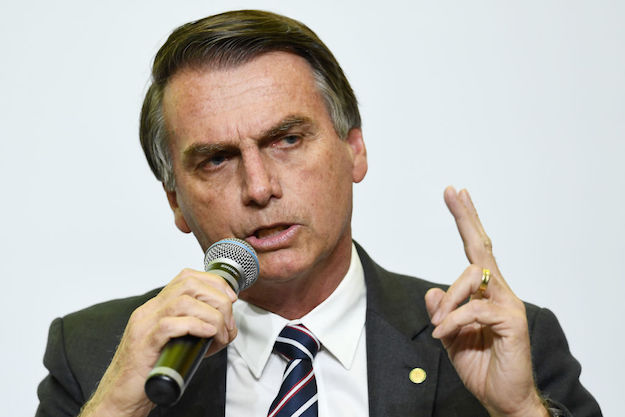Some find the scenario very unlikely, but the recipe for a military coup in Brazil is there. The ingredients: a retired army captain as presidential candidate with a retired general as his running mate, ample support from the armed forces’ rank and file for the “military” ticket, the erosion of democratic institutions, and the deepest economic crisis in recent memory. If we add the extra sauce of a left-leaning candidate possibly trying to pardon a jailed ex-president and let it all sizzle and stir in fake news and social media polarization, the resulting dish could well be a military coup not too different from what we have seen in Brazil and other corners of South America in the 1960s and 1970s.
This Brazilian presidential campaign is different. Since 1994, two parties, the Workers’ Party (PT) and the PSDB, have taken turns as winner and second-place in presidential elections. Presently, the candidate leading the polls is Jair Bolsonaro, a former army captain who has served seven terms in Congress. Bolsonaro first came to public attention after being charged but never convicted of encouraging domestic terrorism to promote higher salaries for the military. He has expressed many times his love for the days of dictatorship (1964-1985) and he has been raising the specter of electoral fraud (if he loses the election, of course). During his 26-year tenure, Bolsonaro was better known for his conflicts with human rights activists, left-wing members of Congress and the political establishment, rather than for playing any significant role in actual lawmaking. A fringe politician from the extreme right, he introduced only two bills in his career, but called for the killing of former President Fernando Henrique Cardoso, remarked that a fellow congresswoman was “not pretty enough to be raped,” and called for a new coup d’état. He was charged by the attorney general for inflammatory attacks on women, black people, gay people, foreigners and indigenous communities, but never did jail time (Bolsonaro was ordered to pay compensation over the rape remark).
All of that should make Bolsonaro nothing more than a tropical extreme right-wing populist in the mold of France’s Marine Le Pen or Holland’s Geert Wilders. But in Latin America, a populist military openly challenging the norms and institutions of democracy brings back fresh memories. Military governments controlled 11 Latin American nations for significant periods from 1964 to 1990. Democracy is a recent reality and even today it remains elusive in places like Venezuela, Cuba and Nicaragua (not to mention the frequent attempts against it, such as Bolivia’s Evo Morales’ recent efforts to overturn a referendum precluding him from running for re-election).
Bolsonaro is more than a system failure, he is a direct threat to democracy. His running mate, General Antônio Hamilton Mourão, has talked of a new constitution without popular participation. Mourão doubled down on the extremist rhetoric after the leading candidate was stabbed, casting blame on the left (“If they want to use violence, we’re the violence professionals”) and he publicly praised military dictatorship, including Brazil’s most notorious torturer, on TV (“Excesses were committed. Heroes kill”).
A retired captain and general espousing violent views already raises eyebrows in a region beset by former dictatorships. But other events also point to the risk of the armed forces mobilizing to “protect democracy” in the form of a direct intervention. For instance, General Mourão raised the possibility that a Bolsonaro government would enact a self-coup “in a situation of anarchy.” Meanwhile, leaders of the Workers’ Party, which will likely be in the run-off against Bolsonaro, have been calling for a presidential pardon for former President Luiz Inácio Lula da Silva if the left wins the October election – a move that could prompt some elements in the military to take action. Lula is in jail for taking bribes.
The rise of Fernando Haddad, the PT candidate, points to a dangerous polarization that fits perfectly into Bolsonaro’s aggressive narrative. Haddad substituted Lula in the ballot. Lula was initially picked by PT, but was barred by the electoral justice because of his corruption-related conviction. The PT is a favorite scapegoat for Bolsonaro, who recently called for “shooting these petralhada,” a derogative term for PT supporters.
Bolsonaro seems to be paving the way, directly or indirectly, for a coup d’état or an authoritarian regime backed by the military. He enjoys ample support among the military’s rank and file. If he wins, the calls for a new constitution curtailing democracy will only grow louder. If he loses, the return of the PT to power on an election portrayed by Bolsonaro’s supporters as fraudulent could be used as an excuse for military action. Brazil is in danger of falling in the damned if you do, damned if you don’t path that leads to a non-democratic outcome.
Stepping away from the precipice will require more than a mea culpa from a candidate who built his career on pursuing the favor of the military. This is the first time that the Organization of American States (OAS) will observe the Brazilian elections. And Brazil needs all the support that pro-democracy countries can muster.
—
Zeidan is a business and finance professor at NYU Shanghai and Fundação Dom Cabral.








